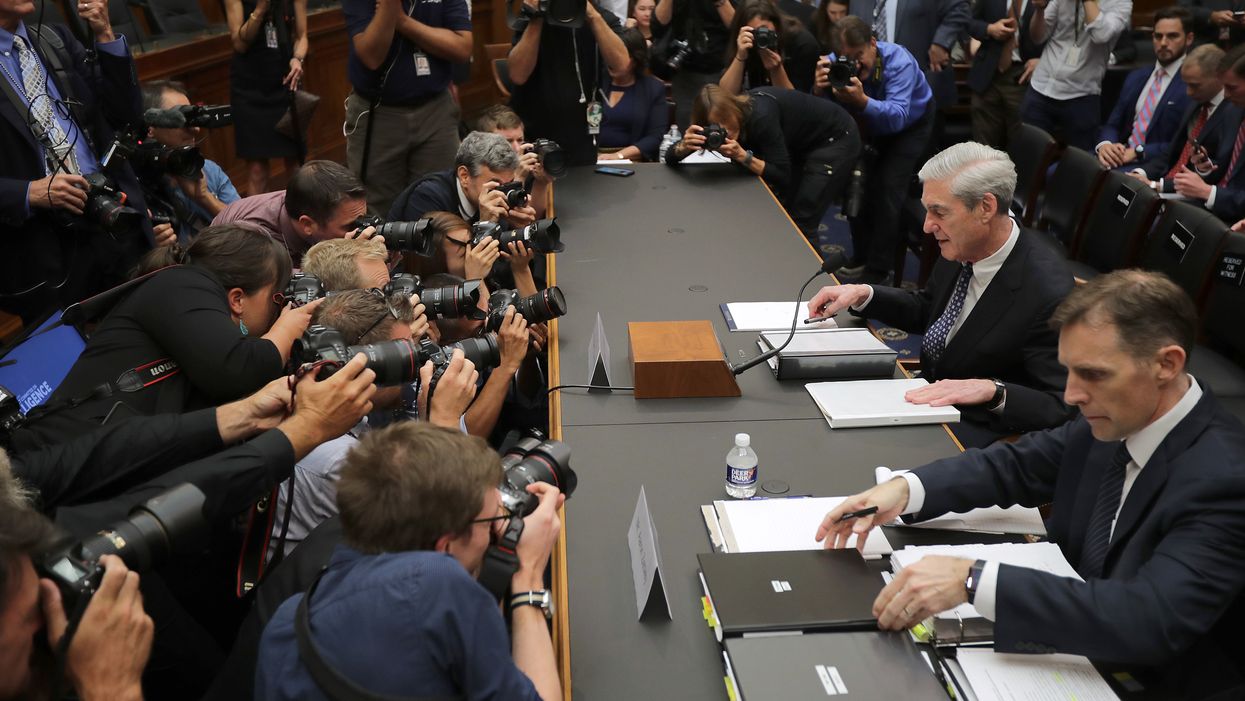The extensive Russian interference in the 2016 election still "deserves the attention of every American," Robert Mueller reiterated Wednesday, but the gaps in election security permitting a foreign adversary to influence the presidential outcome received minimal attention during the former special counsel's day testifying to Congress.
While his testimony was dominated by terse one-word answers or halting sentence fragments affirming the contents of his report, Mueller was crystal clear and emphatically in his own voice on a singular point.
In fact, it was the one thing the former FBI director said, almost word for word, in his opening statements to both the House Judiciary and House Intelligence committees.
"Over the course of my career, I have seen a number of challenges to our democracy. The Russian government's effort to interfere in our election is among the most serious," he told Judiciary at breakfast time. "This deserves the attention of every American."
Appearing after lunch before the Intelligence panel, which has become among the most polarized on Capitol Hill during its own two-year probe of Russian meddling, Mueller added: "And I am sure that this committee agrees."
The nationally televised morning session spent almost no time on the parts of Mueller's April report detailing the porousness of the American election system. Instead, the focus was on whether President Trump obstructed the special counsel's inquiry, during which Democrats succeeded in getting Mueller to bluntly say that he had not cleared the president of obstruction of justice, or "totally exonerated" him, as Trump describes it.
Republicans at both hearings focused on casting doubt on the credibility of the Mueller investigation.
The Democratic lawmakers at the afternoon session did spend some time trying to get Mueller to expand on his report's description of a "sweeping and sophisticated" campaign by Russia to tilt the election Trump's way — highlighted by an expansive social media disinformation and propaganda campaign, the theft and leaking of thousands of Democratic National Committee emails, and finally extensive efforts to hack into the aging voting systems used in bellwether counties and tossup states.
The report provides an extensive catalogue of the vulnerabilities in the U.S. election system that Russia sought to exploit. It infiltrated the emails and computer networks of unwitting election administrators and the companies that supply voting machines and registration software across the country.
As he did in almost all aspects of his testimony, Mueller declined entreaties to expand on his report's findings — or to even read from its 448 pages. While he testified several times that Trump was supposed to be the beneficiary of Russia's efforts, the special counsel curtly said he was "not going to speculate" when asked what, if any, effect all the meddling had on his election victory.
While Congress has been preoccupied by the propriety and political consequences of beginning impeachment proceedings against Trump, which would be based at least in part on the obstruction evidence in Mueller's report, there's essentially no doubt that any charges brought by the Democratic House would produce an acquittal in the Republican Senate.
And for the moment, the same sort of gridlock exists when it comes to the tangible things Congress could do to prevent foreign interference in the 2020 campaign and beyond.
Publicly disclosing the buyers of online political ads, mandating a paper record for each vote, and explicitly banning foreign assistance to presidential and congressional candidates are all provisions in HR 1, the political process overhaul passed by the Democratic House and sentenced to death in the GOP Senate.
Majority Leader Mitch McConnell has promised to bury not only that bill but virtually all other measures aimed at shoring up election security, labeling them either unnecessary or infringing on states' rights to run their own elections. The measure that stands the best chance, especially in light of the bipartisan deal to boost spending Congress is on course to clear this week, would deliver several hundred million dollars to the states for buying modernized voting equipment in time for November 2020.




















Trump & Hegseth gave Mark Kelly a huge 2028 gift